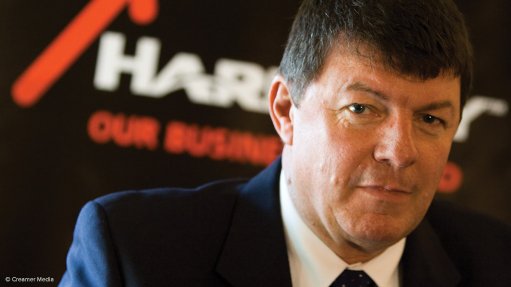
Harmony Gold CEO Graham Briggs
Photo by: Duane Daws
JOHANNESBURG (miningweekly.com) – Gold miner Harmony Gold narrowed its losses by 78% quarter-on-quarter to R226-million, on the back of higher production, in the first quarter of the company's 2015 financial year, ended September 30.
The company’s output increased 6% quarter-on-quarter to 303 341 oz, while revenue rose 18% to R4.43-billion as a result of a 16% increase in gold sold to 321 089 oz and owing to a 2% increase in the rand gold price.
The company said that, although production profit had increased by 8% to R913-million, a net loss had been recorded as a result of a foreign exchange loss of R190-million on foreign debt, as well as an increase in depreciation of R124-million.
Quarter-on-quarter net debt had been reduced to R771-million, compared to net debt of R1.03-billion during the previous quarter.
Harmony further noted that production costs had increased during the quarter under review mainly as a result of gold stock movements of R301-million, as more gold was sold than was produced.
Increases in electricity costs, owing to higher winter tariffs, and the yearly labour cost increase also added R272-million to the total cost increase.
Quarter-on-quarter, the underground grade had also improved by 4% to 4.84 g/t on the back of a 5% year-on-year increase in recovered grade at the end of June 30.
“Our efforts to improve efficiencies are aimed not only at mining and processing, but in every aspect of our business. We remain the most efficient South African gold miner, focused on improving our margins and funding our capital,” Harmony CEO Graham Briggs commented.
He further alluded to Harmony's 50%-owned Golpu orebody, in Papua New Guinea, stating that this resource had the potential to be developed into a world-class copper/gold mine, which would allow Harmony to sustain its business into the future.
“Harmony remains undervalued and its successes are not currently factored into the share price,” Briggs concluded.